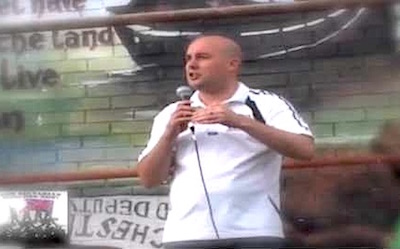
New York lawyer and long-time republican activist Martin Galvin on the recent arrest and internment-by-remand of Ardoyne republican Dee Fennell.
As we move towards the Centenary Commemorations of 1916, the British moved against Easter Commemoration speaker Dee Fennell. My view is that conditions do not exist to support a continuation of Armed Struggle at this time but this view will become harder to defend if the British begin a clampdown on Easter Week Commemoration speakers.
The Carrickmore Easter Commemoration was attended by relatives of Jeremiah O’Donovan Rossa. This Fenian patriot inspired the oft-quoted words ‘Ireland unfree shall never be at peace’. With six counties unfree, these words might be said to run afoul of British law. Should we fear to speak these words and others including Maire Drumm’s, even as Pearse’s oration is re-enacted in Centenary Commemorations elsewhere in Ireland?
What of the 1916 Proclamation itself? It says the people of Ireland hold the right to ‘national freedom and sovereignty’. It seems unlikely that Tom Clarke put his name to something that did not count the people of his home county Tyrone, and 5 others, amongst ‘the whole people of Ireland’. It says this right is ‘indefeasible’, meaning something that can never be bargained, sold, or bequeathed away (even by referendum). It even makes reference to ‘standing on that fundamental right and again asserting it in arms’. Surely these words suggest there have been conditions where it was ‘legitimate’ to do so.
What of the Roll of Honour? British law today regards those that resisted them during the Troubles as mere criminals. For example, Gerry McGeough and Seamus Kearney were imprisoned for IRA actions that took place in 1981. Ivor Bell faces accusations from 1972. How many Republicans carry felon licenses, employment bars or travel restrictions?
The Roll of Honour lists Republicans who were part of that same struggle and died at the hands of British and pro-British forces. Their names on a Roll of Honour say they were not criminals but patriots, whose deeds were not alone legitimate but are remembered with respect and pride. The Roll of Honour and Easter 1916 Proclamation are customarily read in Republican commemorations, because we identify those on the Roll of Honour with the same principles and struggle proclaimed in 1916. Must we pretend otherwise?
There are no doubt readers and friends who will be at pains to argue that Dee Fennell’s case will be the last of it. The British would never clamp down on anyone else. They will make the same arguments they made after Gerry McGeough’s arrest in 2007. Perhaps they can convince Ivor Bell, Seamus Kearney or those holding OTR immunity certificates that the re-elected David Cameron says need no longer be honoured.
![[Irish Republican News]](https://republican-news.org/graphics/title_gifs/rn.gif)
![[Irish Republican News]](https://republican-news.org/graphics/title_gifs/harp.gif)

